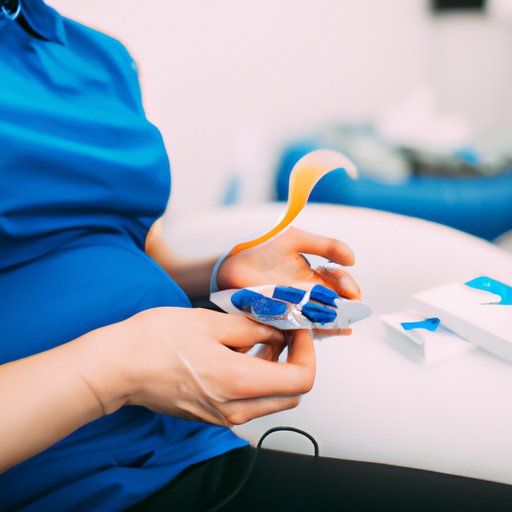
Introduction
Tubal ligation is a popular method of permanent birth control for women who want to prevent pregnancy. It involves blocking or sealing the fallopian tubes to stop the eggs from traveling to the uterus, where fertilization normally occurs. However, many women wonder if it is possible to get pregnant after this procedure and what their options are for parenthood. In this article, we will explore the topic of pregnancy after a tubal ligation in-depth and provide you with all the information you need to make informed decisions about your fertility.
Exploring Your Options: Can You Get Pregnant After a Tubal Ligation?
Tubal ligation, also known as “getting your tubes tied,” is a surgical procedure that closes the fallopian tubes. It is a highly effective form of birth control, with a success rate of 99.5%. However, there are still rare cases where pregnancy can occur, including failed tubal ligation, recanalization, or fistula formation.
Additionally, there are several factors that can influence your fertility following this procedure. These include age, the type of procedure performed, and other medical conditions. If you are considering pregnancy after a tubal ligation, it is important to understand these factors and your options for conception.
Hope After the Procedure: Understanding the Possibility of Pregnancy Following a Tubal Ligation
While the chances of getting pregnant after tubal ligation are slim, there is still a possibility. According to recent studies, the rate of pregnancy after a tubal ligation procedure is about 1%.
Fortunately, there are options available for women who wish to conceive after undergoing tubal ligation. One option is a tubal ligation reversal surgery, which can restore the tubes’ function and allow the eggs to travel to the uterus. Another option is in vitro fertilization (IVF), which involves fertilizing the eggs outside the body and then implanting them in the uterus. Both options have been successful for many women who want to have a child after getting their tubes tied.
It’s worth noting that both alternatives may require extensive medical procedures and financial costs. Additionally, the success rate of these procedures depends on several factors, including age, fertility history, and the type of tubal ligation procedure performed. If you are considering pregnancy after tubal ligation, it’s essential to consult with your doctor about your options and the potential outcomes.
Breaking Down Myths About Tubal Ligation: Debunking Common Misconceptions About Fertility
There are many myths surrounding tubal ligation, including the myths that it causes permanent infertility and that it increases the risk of ovarian cancer. These claims are not supported by scientific evidence and are simply untrue.
Additionally, it’s important to understand that IVF treatment options can increase your chances of getting pregnant if you’re unable to conceive naturally due to other factors such as age or medical conditions. IVF can be used with or without a tubal reversal or in cases where a woman has a single functioning tube. It is a proven method that has helped many women achieve successful pregnancies.
If you are considering tubal ligation or other permanent contraception methods, it’s crucial to understand the facts and do your research before making any decisions about your fertility.
Pregnancy After a Tubal Ligation: Real Stories From Women Who Conceived Following the Procedure
It’s natural to be curious about other women’s experiences with pregnancy after tubal ligation. Many women have successfully conceived after the procedure, and their experiences can offer insight into the different options available for conception.
Robin, a 34-year-old mother of two, got pregnant a year after undergoing tubal ligation. She decided to have a tubal reversal surgery, which was successful. She gave birth to a healthy baby girl nine months later.
Another woman, Sara, 44, underwent IVF after her doctor advised her that a tubal reversal surgery might not be the best option for her age and health condition. The IVF procedure was successful, and she welcomed twins into her life.
If you’re considering pregnancy after tubal ligation, seeking the help of fertility experts who specialize in reproductive endocrinology and fertility can help you explore the best options for your unique fertility situation.
Considering a Tubal Ligation? Taking a Closer Look at Your Reproductive Options and Potential Outcomes
Before undergoing tubal ligation, it’s important to consider all your reproductive options and potential outcomes. This includes weighing the benefits and risks of the procedure, exploring alternatives to permanent contraception, and discussing potential side effects and complications with your doctor.
For some women, the decision to undergo tubal ligation may be based on a number of factors, including age, health, and lifestyle. For others, alternative forms of contraception such as hormonal birth control or condoms may be a better choice. It’s important to remember that permanent contraception is not always the best option for every woman, and that other birth control options are available.
If you do decide to undergo tubal ligation, it’s essential to understand all the potential side effects and complications associated with the procedure. These may include pain and discomfort, infection, bleeding, or damage to surrounding organs. Be sure to discuss these risks with your doctor and follow any postoperative instructions carefully to ensure a healthy recovery.
Conclusion
Pregnancy after tubal ligation is not impossible, but it is rare. Understanding your options and potential outcomes is critical for anyone who has had tubal ligation and wishes to conceive afterward. Whether through tubal reversal surgery, IVF, or alternative methods, there are options available for women who want to expand their families. It is important to consult with your doctor, research your options, and consider all the factors before making any decision about your fertility.
If you have more questions about pregnancy after tubal ligation and your options for conception, we encourage you to talk to your healthcare provider or a fertility specialist who can offer you more specific guidance based on your unique medical history and fertility situation.




